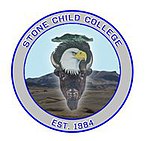 | |
| Motto | Making our dreams happen with academics, culture, and commitment |
|---|---|
| Type | Public tribal land-grant community college |
| Established | 1984 |
Academic affiliations | American Indian Higher Education Consortium American Association of Community Colleges Space-grant |
| President | Cory Sangrey-Billy |
| Dean | Wilma Tyner |
| Location | , U.S. 48°17′24″N 109°52′11″W / 48.29000°N 109.86972°W[1] |
| Campus | Rural |
| Colors | Blue and gray |
| Affiliations | Chippewa-Cree Tribe |
| Website | www |
Stone Child College (SCC) is a public tribal land-grant community college in Box Elder, Montana. SCC is affiliated with the Chippewa-Cree Tribe and located on the Rocky Boy Indian Reservation in north central Montana; it is one of seven Tribal Colleges in Montana. In 2008–09, SCC had an enrollment of 511, of whom 98 percent were American Indian descent; 20 percent were bilingual or of limited English proficiency. SCC students range in age from 17 to 72, with the average age at 30. The college retention rate is 47 percent and the graduation rate is 20 percent.[2]
History[edit]
SCC was chartered by the Chippewa-Cree Business Committee on May 17, 1984.[3] In 1994, the college was designated a land-grant college alongside 31 other tribal colleges.[4]
Academics[edit]
Stone Child offers a Bachelor degree along with Associate degrees in seventeen disciplines and six certificates.[5]
Athletics[edit]
- Basketball: In August 2010 Stone Child College, along with the other tribal colleges around Montana, formed the Montana Tribal Colleges Basketball League.[6] Presently, the college has both a men's and women's team.[7]
Partnerships[edit]
SCC is a member of the American Indian Higher Education Consortium (AIHEC), which is a community of tribally and federally chartered institutions working to strengthen tribal nations and make a lasting difference in the lives of American Indians and Alaska Natives. SCC was created in response to the higher education needs of American Indians. SCC generally serves geographically isolated populations that have no other means accessing education beyond the high school level.[8]
See also[edit]
- American Indian College Fund (AICF)
References[edit]
- ^ "Stone Child College". Geographic Names Information System. United States Geological Survey, United States Department of the Interior.
- ^ American Indian Higher Education Consortium Archived 2012-06-14 at the Wayback Machine
- ^ Stone Child College: History Archived 2011-01-21 at the Wayback Machine
- ^ "NIFA 1994s The First 20 Years of the 1994 Land-Grant Institutions Standing on Tradition, Embracing the Future" (PDF). National Institute of Food and Agriculture. September 25, 2015. Retrieved December 20, 2020.
- ^ Stone Child College: Degrees Offered Archived 2011-01-20 at stonechild.edu (Error: unknown archive URL)
- ^ Montana Tribal Colleges form basketball league | KTVQ.com | Q2 | Billings, Montana Archived 2011-07-26 at the Wayback Machine
- ^ Tribal college basketball takes center stage Archived 2011-02-04 at the Wayback Machine
- ^ American Indian Higher Education Consortium Archived 2012-06-14 at the Wayback Machine
